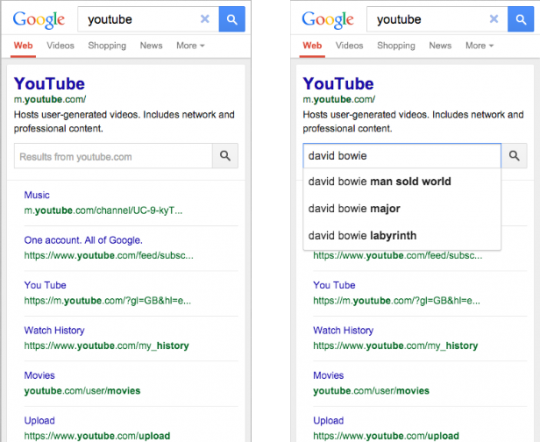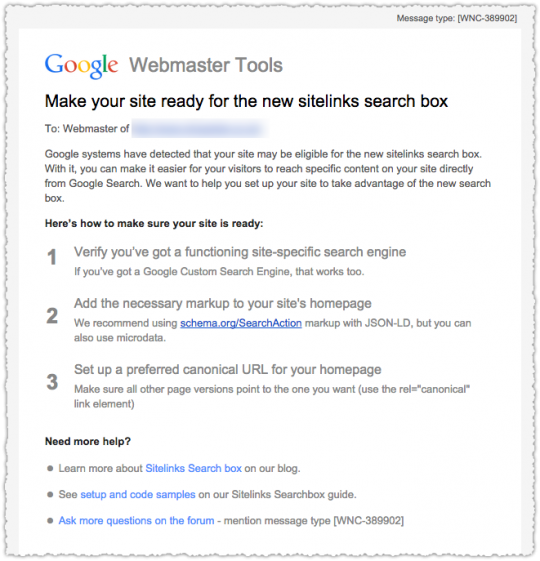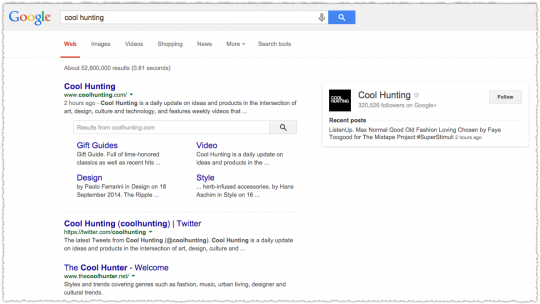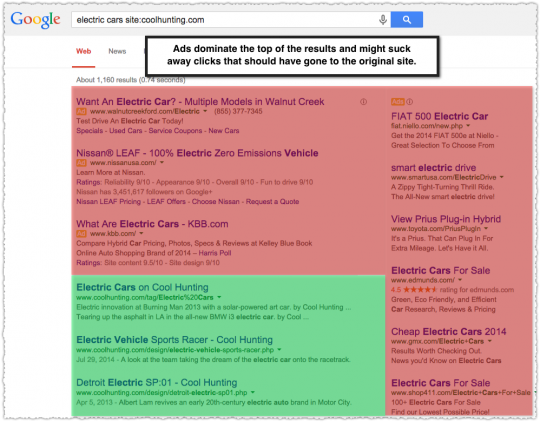Google’s new sitelinks search box threatens to take your hard won branded traffic and hand it over to competitors unless you implement the specified markup.
Here’s what’s happening and why you need to bump the sitelinks search box markup implementation to the top of your priorities.
Sitelinks Search Box

On September 5th Google announced the launch of an improved search box in sitelinks for branded queries.
When users search for a company by name—for example, [Megadodo Publications] or [Dunder Mifflin]—they may actually be looking for something specific on that website. In the past, when our algorithms recognized this, they’d display a larger set of sitelinks and an additional search box below that search result, which let users do site: searches over the site straight from the results, for example [site:example.com hitchhiker guides].
Now I’d argue that the prevalence of any search box in sitelinks was minimal at best. I hardly ever saw them. That’s going to be important to this story later on.
Sitelinks Search Box Email
On September 15th several of my clients received a ‘Make your site ready for the new sitelinks search box’ email informing them that their site was eligible for this feature.

Soon after that email went out I began to see sitelink search boxes appearing on branded queries. That was fast!
Sitelinks Search Boxes UX
What if you haven’t implemented the markup yet? If you don’t implement the markup and connect it to your own search engine Google will simply perform a site: search using your domain and the user’s search query.
The problem? Competitors might suck away that traffic through paid ads on those site: queries. Here’s what it looks like.

Cool Hunting isn’t a client by the way, just an example I happened to find. Now lets search for ‘electric cars’ using the Cool Hunting sitelinks search box.

The user’s intent was to find Cool Hunting but if they use the sitelinks search box to find Cool Hunting content they are presented with a raft of ads for other sites. Not for every query obviously but if you’re running any decently sized brand and getting the sitelinks search box treatment there’s a good possibility for click attrition.
The sitelinks search box could steal your branded traffic.
What really burns here is that the original intent was on a branded term. You’d won mindshare and loyalty. The query intent was clear. Yet that search box might deliver them to unbranded results.
It would be nice to think that users would seek out the branded organic results but monkey clicks happen and the additional friction and options turn a slam dunk into a three point attempt.
Sitelinks Search Box Markup

The experience doesn’t have to be like this though.
If you implement the markup on your site, users will have the ability to jump directly from the sitelinks search box to your site’s search results page. If we don’t find any markup, we’ll show them a Google search results page for the corresponding site: query, as we’ve done until now.
That’s clear enough. Yet the way in which this was rolled out is unsettling to say the least.
The prevalence of presenting the sitelink search box was very low before and even when shown wasn’t very prominent. So to go from that reality to one in which it’s shown far more often and more prominently with 10 days notice seems … uncharitable. That’s not even a standard two week sprint cycle!
I understand the value Google is trying to deliver here. And in some ways I think Google believes that a site: query might be better than many site’s own internal search engines. They’d be right on that account too in many instances.
But if that’s really what Google’s trying to do then searches through the sitelinks search box should only return content for that site. Shouldn’t the ads be suppressed at that point? Otherwise it seems rather self-serving from an advertising perspective. And it doesn’t honor intent.
Of course, by having it behave this way (and having someone like me ring the alarm bell) you might find adoption of the markup increase dramatically. That seems like an awfully big stick though. Not to mention the sites that may never understand what’s going on or have the technical chops and determination to fix it through markup.
TL;DR
The improved sitelinks search box threatens to divert branded traffic to competitors unless you implement the specified markup. Sadly, the current user experience doesn’t seem to match the user’s intent nor Google’s aim to serve the user.
The Next Post: What I Learned In 2014
The Previous Post: Image Sitemap Indexation

7 trackbacks/pingbacks
Comments About Sitelinks Search Box
// 46 comments so far.
Andrew // September 19th 2014
Wow, I originally overlooked this possibility. Thank you.
AJ Kohn // September 19th 2014
No problem Andrew. It kind of snuck up on me as well.
David // September 19th 2014
Yeah have a look it’s showing up on more than a few sites without the schema markup… yep that’s right Google appears to be forcing it to be enabled… so expect it may show up for you site if you like it or not…
AJ Kohn // September 19th 2014
Oh yes David. The sitelinks search box feature is seemingly independent of having the schema markup in place. It’s enabled by Google so if your site is receiving a sitelinks search box you pretty much must implement the markup to connect it to your own search results and preserve your branded traffic.
Jim Robinson // September 19th 2014
Yes, I also saw these pop up all over the place as soon as they made the announcement. Once again, it’s a change the favors those who have the ability to readily implement it. Many never will and Google will gain more revenue from branded searches as a result.
Since it’s supposed to work with autocomplete, where will those links point? I’m guessing those will continue to point to an additional set of Google results even if you have the schema added correctly?
AJ Kohn // September 19th 2014
Jim,
Yeah, they’re ALL over the place now and as it stands you’re right – many will never implement this giving Google additional advertising views and revenue.
None of my clients have the implementation in place yet but once they are I’ll be able to find out what happens with the autocomplete searches. I’m guessing they’ll go to the site and not Google if you have it hooked up but … we’ll see.
Jim Robinson // September 19th 2014
I’ll be interested to see how that works because internal search results pages are blocked via robots.txt on my clients’ sites. If the auto-complete targets point to internal site search URLs and those URLs aren’t supposed to be crawled, that seems like it would be problematic.
AJ Kohn // September 19th 2014
@Jim I don’t think it’ll be a problem looking at the documentation. The markup essentially passes the term to the site’s search engine which then will render the results page.
Dale Harries // September 19th 2014
You have to hand it to Google. They discover these nice little ways to draw even more Adsense traffic / Impressions from even the strongest brand searches.
Anyone else noticed it only appears to happen with brands that have large inventories? Such as department stores and the like.
AJ Kohn // September 24th 2014
@Dale
This definitely smells a bit fishy. As for when it appears, that’s really just algorithmic and based on those sites that get a material amount of branded traffic. It wouldn’t make sense to have a search box for sites not getting a large amount of branded search.
Virginia // September 20th 2014
Good post AJ. Annoying but interesting. Start using schematic. I also see google webmasters tool now is showing data or errors in WMT whereas before there was just a video about schema. My bug bear is that your every day website owner will have no idea about this. Even I have issues understanding schema as the document instructions are not easy to read or understand. Let’s not even mention the new ad words changes coming on October which will provide less visibility to key terms people are bidding on.
Cheers
Virginia
AJ Kohn // September 24th 2014
@Virginia
Well in this instance the every day website owner probably won’t receive the sitelinks search box because they don’t have enough branded traffic for the feature. But even those sites that do qualify for the feature might not a) realize this is going on and b) have the technical savvy to quickly fix it.
So, annoying is a very good word for it all.
Tom Mansell // September 23rd 2014
I’m a little concerned about the potential dip regarding internal site search queries. If Google are offering ways for user’s to bypass this are we potentially going to see a reduction in that data?
Or is the case that if we appropriately mark-up our site search facility, will these search queries that get entered into the sitelinks search box be passed through into our internal site search queries report in GA? I’m guessing probably not!
AJ Kohn // September 24th 2014
That’s a good questions Tom. Let me see if I can find out from some folks over in Google Analytics.
Derek Edmond // September 24th 2014
Hey AJ – thanks for writing this post; interesting indeed. Have you seen any examples of sites that have implemented the schema code correctly and Google is sending searches to the applicable onsite search result destination?
Derek Edmond // September 24th 2014
To add to the previous comment, it appears that the brand-specific search box present when searching “Amazon” and “Target” sends searches to applicable destinations but there does not appear to be schema information assigned.
However for “Ebay” and “Overstock”, the search box keeps users in Google results (and they don’t have code implemented either). In other words, I’m not certain why a couple of these larger sites send users to the applicable third party destination and the others do not; or how the code will have impact.
AJ Kohn // September 24th 2014
I’m not sure Derek but I can confirm that the code is in place and working for Pinterest.
The Amazon and Target examples are … curious. Could Google have implemented this for them? If so, you’d think it was because they weren’t keen on having Amazon and Target screaming at them about potential lost traffic.
Derek Edmond // September 24th 2014
Interesting and good find. Pinterest is the first example I’ve come across that has site search enabled, results point to the destination’s domain, and schema markup is enabled. Symantec and TripAdvisor post similar results as Amazon and Target.
I’m trying to get a couple of our clients to implement this change, that also have site search visible in brand based search results. I’ll keep you posted and hopefully the change in results is swift.
Selvam // September 25th 2014
Is there any pre-made plugin for wordpress to implement this feature?
AJ Kohn // September 27th 2014
Not to my knowledge Selvam.
Jeff Gold // September 27th 2014
Hi AJ – We’ve implemented the schema on the homepage of livingsocial.com (and Google has crawled/indexed it recently), and are still seeing the site: results.
Curious, especially as Derek mentioned, sites like Amazon dont seem to have the markup added yet searches deep-link to Amazon site search.
I wonder if there is a lag time from schema implemention to Google honoring it, and if so what factors determine that.
AJ Kohn // September 27th 2014
Jeff,
Thanks for your comment and for reporting your implementation status. It is curious that some major brands seem to have been granted this feature without the specified markup.
What I can tell you is that it does take some time for Google to recognize the markup and switch over to the site’s internal search engine. It seems like 4-7 days in most cases. In addition, it’s very exacting – so any deviation from the markup guidelines may prevent Google from switching over. Unfortunately I don’t think there is a robust (or any) error messaging system to help sites diagnose the markup issues.
Let me know here (or privately if you wish) if/when things change.
Mike Gracen // September 29th 2014
@Jeff Gold Yours _may_ not be working b/c your canonical isnt a perfect match. You page canonical has trailing slash, your JSON markup for new search box does not.
With that said, we have also been trying to get this to work for over a week now and we are in the same boat. Just getting site: results. Very frustrating.
In addition to Amazon and Pinterest cases, I noticed that Sears.com does not have the code implemented but is receiving the search box anyway. BUT with site: results.
Go figure, Google rolled something out while still apparently in beta (alpha?) and forced us all in to it..
AJ Kohn // September 29th 2014
@Mike
That’s a good catch on the canonical difference. It’s just that sort of exactness that makes implementing this difficult.
And just to clarify, any site can receive the sitelinks search box if Google believes they get enough branded query volume regardless of whether you implement the markup or not. Once the feature is activated by Google you get the site: treatment until the markup is correctly implemented and recognized.
Jeff Gold // September 29th 2014
Great catch. We’re going to update the json link today and will monitor from there.
Jay // September 30th 2014
I wonder if they would use the query data from those search boxes to determine sitelinks? Might even be useful for ordering all the results for a branded query.
Also, I agree with the speculation that “…Google believes that a site: query might be better than many site’s own internal search engines.” Can’t tell you how many times I’ve had disappointing results on a site’s internal search and then resorted to a site: search. Seems like this would be particularly important for websites that have spent a lot of time honing their internal search engines.
AJ Kohn // October 01st 2014
@Jay
Thanks for your comment. And I absolutely think Google is tracking and using the query data from those search boxes to inform sitelinks and other features.
Andy Crestodina // October 01st 2014
I agree that the ads should be suppressed.
I just did a site search from the Wikipedia sitelinks search box and I landed on a Google SERP. Is it possible that they haven’t marked up their site properly yet? If so… yikes!
AJ Kohn // October 01st 2014
@Andy
Suppressing ads would be the right thing to do in my mind. And I don’t see any markup on Wikipedia and I’m guessing that Google doesn’t feel the need to do this for them since they’re not a for profit business (i.e. – Jimmy Wales isn’t going to scream bloody murder at Google like Target or Amazon might.)
Jeff // October 02nd 2014
two questions:
1.) Any idea how this will impact onsite search reporting? is there any referrer type? How will my site differentiate this traffic?
2.) Will this start indexing my search pages if I don’t have them ‘noindexed’?
Shell Harris // October 03rd 2014
I remember attending an Internet marketing convention in New York about 8 years ago. I remember the Google rep speaking to the audience and say, “Our goal is to have the user never need to leave Google.com.” It seems this is getting closer and closer to reality. The speaker after him was Jason Calacanis who did indeed say, “SEO has no future.” It appears both speakers were being prophetic.
Derek Edmond // October 05th 2014
Jeff Gold / AJ – was performing checks tonight and it appears that Living Social’s Site Search instruction is now working appropriately / as defined via markup
Jeff Gold // October 06th 2014
Thanks for the heads up Derek! So that did take about a week after we added the code.
Note that we made 2 modifications – added a trailing slash to our schema homepage URL (which matches our rel-canonical), and moved the json-ld schema to the section. This may come in handy for other sites as they troubleshoot.
Jeff Gold // October 06th 2014
Seems like you cant put brackets in comments – I meant to say, moved the code to the HEAD section.
Jim Robinson // October 06th 2014
Jeff Gold – of those two modifications, I think it was the canonical fix that helped you. We have this working on a site where the json-ld code was placed just inside the closing body tag and it’s working fine. We put it into production on Thursday and Monday morning it’s working.
Addy Steve // October 11th 2014
My first time on your site. Most of your post are very long but very informative. Just realized how little I know about Sitelinks. Thoroughly enjoyed reading your post. Thank you for sharing this post and your thoughts and knowledge on this topic.
Raman // October 27th 2014
I am still curious to get the answers to below
two questions:
1.) Any idea how this will impact onsite search reporting? is there any referrer type? How will my site differentiate this traffic?
2.) Will this start indexing my search pages if I don’t have them ‘noindexed’?
AJ Kohn // November 12th 2014
Raman,
I’m still waiting to hear back about these questions. I’ll update this post when (or if) I get an answer.
Yair Spolter // November 04th 2014
Thanks for another great, informative post, AJ.
For some reason, a search for our company name (“hometalk”) does not produce the search box in the results.
Can you please clarify:
Will adding the code make the search bar appear, or is it only going to change the functionality of the search box (to on-site search) for results that are already showing a search bar?
AJ Kohn // November 12th 2014
Yair,
No. Adding the code will not make the sitelinks search box appear. That is a feature that Google enables based on their own analysis of branded traffic to a site.
Yair Spolter // November 12th 2014
Thanks.
rahul // November 21st 2014
Actually today I do paste the code on taskr.in but after page caching-site search bar not appearing on google search results. So plztell me this code is right or not. if correct so tell me how much will it take a time.
AJ Kohn // November 22nd 2014
Rahul (and anyone else with this question), if your site is not getting the sitelinks search box now the code WILL NOT get it to render.
The code only works once Google has deemed that your site qualifies for the sitelinks search box.
James Hanson // November 28th 2014
Hey @AJ, would you please like to tell us how to get qualified for sitelinks search box? I am new to all these and searching for a reliable resource to get used to with all these Google things. 🙂
AJ Kohn // December 04th 2014
James,
There’s no published metric on what volume of branded search is required to qualify for the sitelinks search box. It’s all up to Google and their analysis of your branded traffic.
Jero // December 17th 2014
Hi AJ,
Question: Can you put the JSON markup in GTM or do you have to post it directly in the html ?
Sorry, comments for this entry are closed at this time.
You can follow any responses to this entry via its RSS comments feed.